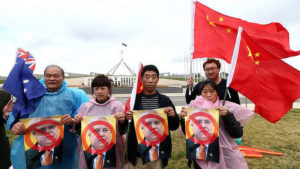
Outspoken MP and leader of the Palmer United Party, Clive Palmer, had to write a letter of apology to the Chinese Ambassador in Australia after the comments he made on live television in August 2014 Photo: Alex Ellinghausen
ON 18 AUGUST 2014, Clive Palmer, a maverick Australian businessman, Member of Parliament and leader of the Palmer United Party (PUP), appeared on the popular and unscripted, live-to-air Australian Broadcasting Corporation show Q&A, in which politicians and others answer audience questions. In response to a question regarding allegations of improper electoral funding, he launched into an off-piste attack on China that clearly shocked his fellow panellists and audience members: referring to ‘Chinese mongrels’, he explained: ‘I’m saying that because they’re Communist, they shoot their own people, they haven’t got a justice system and they want to take over this country. And we’re not going to let them.’ He accused the Chinese government of wanting ‘to bring workers here to destroy our wage system’, take over Australian ports ‘and get our resources for free… . I don’t mind standing up against the Chinese bastards and stop them from doing it’.
The Chinese response was immediate: protests in front of Parliament House in Canberra, and anger on Chinese social and official media alike. The Global Times 环球时报 published an op-ed calling it a ‘vicious attack’. But it saw in it a larger pattern: ‘China must be aware that Palmer’s rampant rascality serves as a symbol that Australian society has an unfriendly attitude toward China’. While acknowledging that members of the government had scrambled to condemn Palmer’s remarks, it likened them to ‘bitter remarks against China’ made ‘without any reason’ by Prime Minister Tony Abbott and Foreign Minister Julie Bishop. It didn’t specify what these were but they undoubtedly referred to the vociferous criticisms of both China’s claims and actions with regard to the disputed Diaoyu/Senkaku islands and Abbott’s claim that Japan was Australia’s ‘best friend in Asia’.
The Global Times said that these ‘prancing provocateurs’ needed to learn the ‘price they pay when they deliberately rile us’ and called for China to marginalise Australia in its global strategy, including that of business. The Global Times concluded: ‘Australia is a remote business partner, and a place where the Chinese can take a trip and learn some English. These basic understandings should be the starting points for China to re-orientate Sino-Australian relations.’
On 25 August, Palmer sent a letter to the Chinese ambassador to Australia to ‘sincerely apologise for any insult to the Chinese people’ and regretted any ‘hurt or anguish’ caused by his comments.
Palmer has been involved in a long-running and acrimonious business dispute with a Chinese company. He held rather different views in 2009, pillorying then prime minister Kevin Rudd’s China policy and federal government restrictions on Chinese investment in Australia: ‘Suddenly there’s a great cry in Australia about Reds under the bed… . We’ve got the opportunity to grab that if our politicians could only be fair and treat the Chinese people and Chinese government with the dignity they deserve.’
Notes
Jamie Walker, ‘China foreign investment rules racist, says Clive Palmer’, The Australian, 29 September 2009, online at http://www.theaustralian.com.au/business/mining-energy/china-foreign-investment-rules-racist-says-clive-palmer/story-e6frg9df-1225780892558


